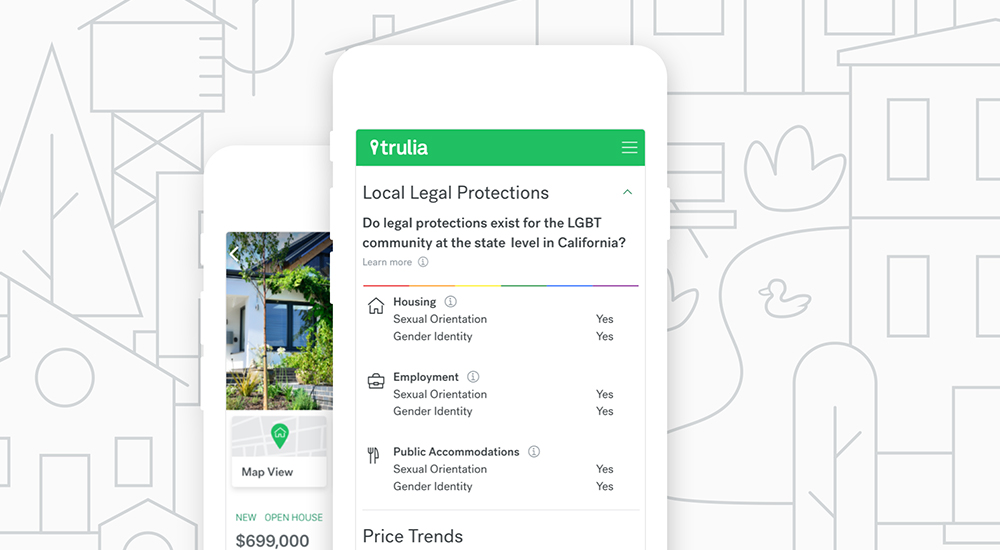If you’re thinking about renting or buying, it’s useful to familiarize yourself with the Fair Housing Act, which can help you spot unfair treatment before it’s too late. This guide breaks down the basics of the Fair Housing Act, including who is protected from discrimination (and how to use Trulia as a resource), how renters and buyers are specifically protected under the law, and how to take action if you think you’ve been treated unfairly.
Disclaimer: This guide has been prepared for informational purposes only and should not be relied on for legal advice. Zillow Group, Inc. does not guarantee that the information in this guide is adequate or that it is compliant with current, applicable laws. This guide is not a substitute for the services of an attorney and you should consult a licensed attorney in your jurisdiction.
What is the Fair Housing Act?
The Fair Housing Act is a federal law that protects certain individuals and families from discrimination in the sale, rental, financing, or advertising of housing.
The law was passed in 1968 with the understanding that people should have the right to rent a home, buy a home or get a mortgage without being treated differently based on their membership in a class of people. Today, the same premise of shielding renters and buyers from discrimination is enforced on a federal and state level, but with expanded protections.
Who is protected under the Fair Housing Act?
The Fair Housing Act includes a description of “protected” classes of people, or people who have historically been discriminated against. Protected classes of people have the right to fair treatment in the rental or purchase of a home under this Act. The original legislation prohibited discrimination on the basis of only race, color, religion, sex and national origin, but was then amended in 1988 to widen coverage to also include disability and family status.
Protected Classes Under Federal Law
- Race
- Family status
- Color
- National origin
- Religion
- Handicap
- Sex
While all states are required to comply with the Fair Housing Act, some states and/or cities also protect additional groups of individuals from housing-related discrimination. For example, California extends beyond the Fair Housing Act with these additional protected classes:
- Source of Income
- Sexual Orientation
- Marital Status
- Age
- Gender Identity & Gender Expression
- Ancestry
- Genetic Information
Trulia Helps People Understand Legal Local Protections
Whether you’re looking to rent or buy anywhere in the United States, you’re covered by the seven federal classes, but as stated above, states and cities have the right to grant further protection to additional protected classes. For people who identify as LGBT, that means explicit protections do not exist at the federal level and aren’t always the same at the state or local levels.

With the Local Legal Protections feature available on all for sale properties on Trulia, you’ll be able to know if a home is in a place where local laws exist to prevent discrimination based on gender identity and sexual orientation in the areas of housing, employment, and public accommodations.
How are you protected?
When it comes to buying or renting a home, the following are some of the actions the Fair Housing Act prohibits landlords or sellers from taking the following actions based on the renter or buyer’s race, color, religion, sex, national origin, disability, or familial status (familial status includes pregnant women and anyone under the age of 18):
- Refusing to rent or sell housing.
- Lying about the availability of housing.
- Placing different conditions in home selling or renting.
- Providing different accommodations.
- Using discriminatory language in property advertisement.
When it comes to financing a home, the following are examples of actions the Fair Housing Act prohibits lenders from taking the following actions based on the buyer’s race, color, religion, sex, national origin, disability, or familial status.
- Refusing to make a loan.
- Placing different conditions on the loan, such as interest rates or points.
- Establishing different requirements for purchasing a loan.
- Refusal to make information about the loan available.
- Discriminatory practices in property appraising.
Exemptions to Fair Housing Protections
Although most housing is covered by the Fair Housing Act, there are exceptions to when these protections do not apply. Each state can choose if it wants to recognize the federal exemptions. The exemptions covered under the 1988 amendment include:
- Owner-occupied housing: Multifamily homes of no more than four units, with at least one unit being owner-occupied are exempt.
- Age: People 62 years old or older, or in some cases, people 55 years old or older are not protected when at least one occupant per unit is 55 and at least 80 percent of the units are occupied by people ages 55 or older.
- Religious organizations: Housing sponsored by a religious organization is exempt, as long as the religion doesn’t discriminate in its acceptance policies.
- Private clubs: An organization with certain requirements for membership is exempt, as long as it only offers housing to its members.
- Single-family housing: Any single-family house sold or rented without a broker by an owner who doesn’t own more than three single-family homes at one time.
How can you make a fair housing complaint?
If you feel your rights to fair housing have been violated, you can file a formal complaint with the Department of Housing and Urban Development (HUD). It is the Fair Housing Act that sets forth the protections from discriminations, but it is HUD that enforces and administers the Fair Housing Act.
Although you have up to one year after an alleged violation to file a complaint, but you should file it as soon as possible to expedite the process. Your claim will be investigated, and HUD will determine if it is valid and worthy of further legal action.
If you choose to file a claim, you’ll need to provide the name, company name, and address of the person who you believe discriminated against you. You will also need to provide a short description of the alleged violation, and how you think you were discriminated against.
You can complete a Housing Discrimination Complaint Form and submit it online.



